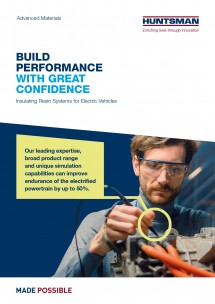In the vacuum casting process, resin and hardener are separately degassed, heated and stirred into vacuum tanks. This operation guarantees homogeneity, low viscosity and the absence of air for both components, which enhance the quality of the final casting.
The unit to be cast is pre-heated and placed into a vacuum chamber, in which a preliminary “dry” vacuum cycle takes place in order to remove residual humidity from windings and insulating materials. The addition of heat, together with the lowest possible vacuum value, helps this step to be faster and more effective. Residual pressure is then increased to the processing value, and resin and hardener flow to the mixing head and into the part at a defined rate of speed, to completely cover the windings.
The last step in the process is the curing cycle, which brings the resin to its final glass transition temperature (Tg) and mechanical properties.
Huntsman’s automotive products are the result of many years of leadership in the global electrical insulation sector. We continuously study and improve our materials in order to deliver fast curing cycles in serial production and meet the most challenging productivity targets.
Huntsman technical support is available to guide customers through the setup phase of all processing parameters by using industrial vacuum casting machines available at our application laboratories. We offer a training program aimed to understand both insulating materials and processing technologies, including production of sample parts by simulation of casting processes.


